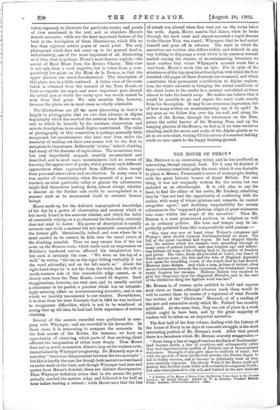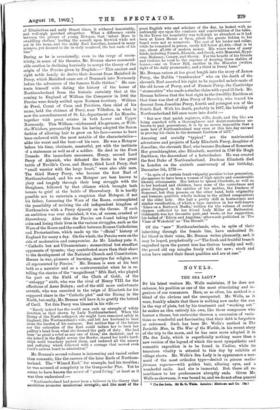THE HOUSE OF PERCY.*
Ma. BRENAN is an interesting writer, and he has produced an interesting, though unequal, book. Yet it may be doubted if these volumes constitute quite the work which it was desirable to place in Messrs. Freemantle's series of monographs dealing with the great historic houses of Great Britain. For one
thing, it was not originally written for the series, but was included as an afterthought. It is odd, also, to say the least, to find the editor of the series, Mr. Lindsay, admitting that he "has not had the opportunity of conferring with the author, with many of whose opinions and remarks he cannot altogether agree," and declining responsibility for certain references to the " supposed plebeian origin of great statesmen who come within the scope of the narrative." Then Mr, Brenan is a most pronounced partisan in religious as well as in ordinary politics. His tone and temper may be im- perfectly gathered from this comparatively mild passage :—
" The time was now at hand when Wolsey's arrogance and Wolsey's spies should torment Northumberland no more. The fall of the great Cardinal had begun. He had stepped blindly into the meshes which his enemies were spreading through so many years of patient hatred; and once trapped, age and infirmi- ties forbade all hope of his winning back to the paths of freedom and power. His voice, lately all-powerful at Court, was heard of Royal ears no more; his fate and the fate of England depended now upon the wheedling words of the wench that he had flouted, Mistress Anne Boleyn. And while a man, in time of victory, often shows forbearance towards the conquered, the triumphant woman rarely forgives her enemies. Mistress Boleyn was resolved to glut her vengeance upon the disgraced Minister, and in the ears of the libidinous King her lightest word was law."
Mr. Brenan is, of course, quite entitled to hold and express such views as these, although whoever reads them would do well to correct them by means of a reperusal of what Froude has written of the "libidinous" Monarch, or of a reading of the new and exhaustive study which Mr. Pollard has recently published. At the same time, they are out of place in a work which ought to have been, and by the great majority of leaders will be taken as, an impartial narrative.
The first half of the first volume, dealing with the history of the house of Percy in its days of romantic struggle, is the most interesting portion of Mr. Brenan's work. After that period there is a decadence which Mr. Brenan scarcely exaggerates :--
" From being a line of rugged warriors the Earls of Northumber- land became, firstly a line of courtiers, and subsequently (after they had experienced the perfidy of Princes) one of broad-minded statesmen. Strength of arm gave place to subtlety of mind ; but with the growth of their intellectual powers, the Percies began to fail in bodily stamina, and to become as physically weak as they were mentally vigorous. The bloody Wars of the Roses could not destroy this fruitful stock while still rooted in its congenial North; but once transplanted to city soil, and trained in the new fashions
of Elizabethan and early Stuart times, it withered lamentably, and well-nigh perished altogether. What a difference exists between the picture of young Hotspur, that infant Mars in swaddling clothes,' leading the assault upon Berwick while not yet in his teens, and the sickly Earl Josceline, learned in many sciences, yet doomed to die in early manhood, the last male of his line."
Daring as he is occasionally, even to the verge of eccen- tricity, in some of his theories, Mr. Brenan shows commend-
able caution in declining hurriedly to accept the theory of the origin of the Percies given by Dugdale :—" This ancient and right noble family do derive their descent from Mainfred de Percy, which Mainfred came out of Denmark into Normandy before the adventure of the famous Rollo thither." He con- tents himself with dating the history of the house of Northumberland from the historic certainty that at the coming to England of William the Conqueror in 1066 the Percies were firmly settled upon Norman territory. William de Perci, Count of Caux and Poictiers, then chief of his name, held the chateau of Perci, near Villedieu, in what is
now the arrondissement of St. LO, department of La Manche, together with great estates in both Lower and -Upper Normandy. This William—nicknamed Als-gernons, or With- the-Whiskers, presumably from his having adopted the Saxon fashion of allowing hair to grow on his face—seems to have been endowed with the most notable of the characteristics— alike the worst and the best—of his race. He was a Hotspur before his time, obstinate, masterful, yet with the instincts
of a statesman as well as of a soldier. He died in the First Crusade. His immediate successors, Henry, second Lord Percy of Alnwick, who defeated the Scots in the great battle of Neville's Cross, and Henry, third Lord Percy, that " small warrior with the large heart," were also able men. The third Henry Percy, who became the first Earl of Northumberland, and his son Hotspur are best known to glory and tragedy through their long struggle with the Douglases, followed by that alliance which brought both houses to grief at the battle of Shrewsbury. It is hardly possible not to entertain a suspicion that Hotspur, if not his father, foreseeing the Wars of the Roses, contemplated the possibility of reviving the old independent kingdom of Northumbria with a Percy dynasty on the throne. If such an ambition was ever cherished, it was, of course, crushed at Shrewsbury. After this the Percies are found taking their sides and losing their lives in the various struggles, such as the Wars of the Roses and the conflict between Roman Catholicism and Protestantism, which made up the " official" history of England for many a day. On the whole, the Percies were on the side of moderation and compromise. As Mr. Lindsay puts it, " Catholic but not Ultramontane ; monarchical but steadfast opponents of tyrants; they contributed more than their share to the development of the National Church and Constitution. Heroes in war, pioneers of learning, martyrs for religion, are all represented by Percies." Mr. Brenan is seen at his best both as a narrator and as a controversialist when he is re- telling the stories of the " magnificent " fifth Earl, who played
his part on the Field of the Cloth of Gold ; of the " unhappy " sixth, who was the rival of Henry VIII. for the
affections of Anne Boleyn ; and of the still more unfortunate seventh, who was executed in the reign of Elizabeth for his supposed share in the "Catholic plot" and the Rising in the North, but really, Mr. Brenan will have it, to gratify the hatred of Cecil. Yet this Percy was blessed in his wife :—
"Rarely indeed has the world seen such an example of wifely devotion as that shown by Lady Northumberland. When the Rising of the North collapsed, she might have remained safely in England, like Westmoreland's wife, and left her husband to bear alone the burden of his rashness. But neither fear of the future nor the entreaties of the Earl could induce her to turn her palfrey's head from what she deemed the path of duty. She had been ' as great a rebel as any one of them,' she declared ; and so she joined in the flight across the Border, shared her lord's hard- ships until treachery parted them, and endured all the misery and suffering which followed with a courage that moved even Cecil's callous heart to admiration."
Mr. Brenan's second volume is interesting and varied rather
than romantic, like the careers of the later Earls of Northum- berland. The " Wizard Earl," for example, bad his troubles ; he was accused of complicity in the Gunpowder Plot. Yet he seems to have known the secret of " good living," at least as it was then understood :- " Northumberland had never been a believer in the theory that asceticism promotes intellectual strength ; and like most of the great English wits and scholars of the day, he looked with no unfriendly eye upon the comforts and convivialities of the table. In the Tower his hospitality was well-nigh as abundant as it had been at Essex House or Syon, albeit the guests bidden to his board were not so numerous. The cost of his larder and cellar, while he remained in prison, rarely fell below £1,400,—that is to say, about 47,000 of modern money. His wines were of many kinds, inclu French, Rhenish, and Greek, with Muscatel, Hypo- eras, Malmsey, Canary, and Sherry. For the benefit of his friends and visitors, he went to the expense of keeping three stables of horses,—one on Tower Hill, another in the Minories (within sight of his daily promenade), and a third in Drury Lane."
Mr. Brenan enters at too great length into the story of James Percy, the Dublin " trunkmaker " who on the death of the eleventh Earl asserted his right to be regarded as heir-male of the old house of Percy, and of Francis Percy, the Cambridge " stonecutter" who made a similar claim with equal ill-luck. Mr. Brenan believes that the best right to the (twelfth) Earldom at that time was that of Alan Percy of Beverley, who traced his descent from Josceline Percy, fourth and youngest son of the fourth Earl. With his death, probably in 1687, the heirship of Northumberland fell once more into doubt But now that parish registers, wills, deeds, and the like are being searched with a thoroughness and disinterestedness un- known to past generations, it is by no means impossible that a male heir of Northumberland may even at this late day succeed in proving his claim to the dormant Earldom of 1377."
Amusing and socially "typical" are the matrimonial adventures and projects of Lady Elizabeth Percy, daughter of Josceline, the eleventh Earl, who became Duchess of Somerset. Her granddaughter, also Elizabeth, married in 1740 Sir Hugh Smithson, the descendant of a haberdasher. He was created the first Duke of Northumberland. Duchess Elizabeth died in London on the sixtieth anniversary of her birthday, December 5th, 1776 :- " In spite of a certain frank vulgarity peculiar to her generation, she appears to have been a woman of high spirits and considerable literary attainments. Her letters to Queen Charlotte, as well as to her husband and children, have none of the correctness and grace displayed in the epistles of her mother, the Duchess of Somerset, but they possess, on the other hand, both originality and humour, qualities wholly lacking in the stilted compositions of the elder lady. She had a pretty skill in bouts-rimes and similar versification, of which a type survives in her well-known Lines on a Buttered Muffin,' written for the volume of society rhymes collected by her friend Lady Miller at Batheaston. Goldsmith was her favourite poet, and wrote, at her suggestion, his ballad of Edwin and Angelina,' afterwards published in The Vicar of Wakefield' as The Hermit:" Of the " new " Northumberlands, who, in spite of their inheriting through the female line, have undoubted St. Lo blood in their veins, Mr. Brenan writes pleasantly, and, it may be hoped, prophetically :—" The fresh and fruitful branch engrafted upon the parent tree has thriven broadly and well; the proud old sap mingles freely with the new ; stock and scion have united their finest qualities and are at one."



































 Previous page
Previous page